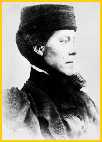Mary Henrietta Kingsley (1862-1900) as a British explorer who made pioneering trips to West and Central Africa.
Mary Henrietta Kingsley (1862-1900) was a British explorer who made two pioneering trips to West and Central Africa. She was the first European to enter remote parts of Gabon.
Early Life
Mary Kingsley was born in Cambridge, England, on October 13, 1862. She was taught to read at home, but she was never given a formal education (although her brother was). She stayed at home and cared for her invalid mother until her mother and father died in 1892 (when Mary was 30 years old). In 1892, after the death of her parents, Kingsley went to the Canary Islands (off the coast of West Africa).
First West African Trip
In 1893, Kingsley went to West Africa to study religion; she intended to write about her adventures and complete the studies on religious fetishes that her father, George Henry Kingsley, had begun. Although a woman traveling alone was almost unheard of at this time in history, this did not deter Kingsley.
In August, 1893, Kingsley left Britain for West Africa, traveling on a cargo ship (commanded by Captain Murray). She sailed along the coast (from Freetown, Sierra Leone, to Luanda, Angola) for months and then she traveled inland from Guinea to what is now called Nigeria. She collected many scientific specimens, including insects and fresh-water fishes, for the British Museum while she explored the lower Congo River.
Second West African Trip
On her second West African trip, Kingsley left Liverpool, England, on December 23, 1894, on the ship Batanga (commanded by Captain Murray). She went from the Canary Islands to Sierra Leone and on to Gabon, and traveled up the Ogowé (now the Ogooué) River; first by steamboat, and then by canoe. She was the first European to visit remote parts of Gabon and the French Congo. Kingsley visited the Fang tribe, who had a reputation for fierceness and cannibalism. She climbed the southeast face of Mt. Cameroon, the tallest mountain in West Africa (14,435 ft/4400 m). During this trip, she traded British cloth for ivory and rubber (this is how she paid for her trip).
After returning to England in 1895, Kingsley wrote the controversial book, “Travels in West Africa” (published in 1897). In this book, Kingsley wrote of her opposition to many of the common European practices in Africa and of her sympathy for African natives; this was not a popular stance.
Final Trip to South Africa
Kingsley returned to Africa in 1899, during the Boer War (Great Britain fighting the Afrikaner Republic of South Africa). She worked as a journalist and a nurse in Simon’s Town, South Africa. As a nurse, she tended Boer prisoners of war. She wrote the book, “West African Studies” (1899). Kingsley died of typhoid (enteric) fever on June 3, 1900 - she was only 38 years old. Kingsley was buried at sea, as she requested.

